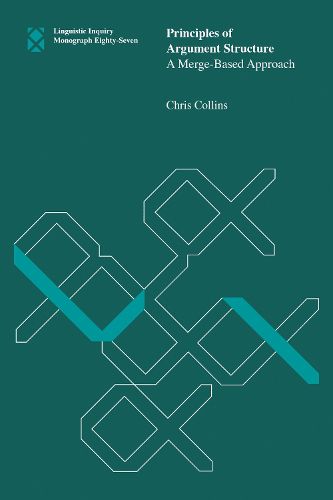Readings Newsletter
Become a Readings Member to make your shopping experience even easier.
Sign in or sign up for free!
You’re not far away from qualifying for FREE standard shipping within Australia
You’ve qualified for FREE standard shipping within Australia
The cart is loading…






A new theory of argument structure, based on the syntactic operation Merge and presented through an in-depth analysis of properties of the English passive construction.
A new theory of argument structure, based on the syntactic operation Merge and presented through an in-depth analysis of properties of the English passive construction.
In Principles of Argument Structure, Chris Collins investigates principles of argument structure in minimalist syntax through an in-depth analysis of properties of the English passive construction. He formulates a new theory of argument structure based on the only structure-building operation in minimalist syntax, Merge, which puts together two syntactic objects to form a larger one. This new theory should give rise to detailed cross-linguistic work on the syntactic and semantic properties of implicit arguments.
Collins presents an update and defense of his influential 2005 theory of the passive, including a completely original theory of implicit arguments. He makes a direct empirical argument for the Theta-Criterion against various claims that it should be eliminated. He also discusses the conception of voice in syntactic theory, arguing that VoiceP does not introduce external arguments, a position otherwise widely accepted in the field. He shows how the "smuggling" approach to the passive extends naturally to the dative alternation accounting for a number of striking c-command asymmetries. He compares syntactic and semantic approaches to argument structure, outlining conceptual problems with adopting formal semantics as the basis for a theory of argument structure.
The book will be of interest not only to syntacticians and semanticists, but also to typologists investigating the cross-linguistic properties of the passive, psycholinguists and computer scientists working on natural language understanding, and philosophers thinking about the issue of "implicit content." It includes an appendix that provides common-sense guidelines for doing syntactic research using internet data.
$9.00 standard shipping within Australia
FREE standard shipping within Australia for orders over $100.00
Express & International shipping calculated at checkout
A new theory of argument structure, based on the syntactic operation Merge and presented through an in-depth analysis of properties of the English passive construction.
A new theory of argument structure, based on the syntactic operation Merge and presented through an in-depth analysis of properties of the English passive construction.
In Principles of Argument Structure, Chris Collins investigates principles of argument structure in minimalist syntax through an in-depth analysis of properties of the English passive construction. He formulates a new theory of argument structure based on the only structure-building operation in minimalist syntax, Merge, which puts together two syntactic objects to form a larger one. This new theory should give rise to detailed cross-linguistic work on the syntactic and semantic properties of implicit arguments.
Collins presents an update and defense of his influential 2005 theory of the passive, including a completely original theory of implicit arguments. He makes a direct empirical argument for the Theta-Criterion against various claims that it should be eliminated. He also discusses the conception of voice in syntactic theory, arguing that VoiceP does not introduce external arguments, a position otherwise widely accepted in the field. He shows how the "smuggling" approach to the passive extends naturally to the dative alternation accounting for a number of striking c-command asymmetries. He compares syntactic and semantic approaches to argument structure, outlining conceptual problems with adopting formal semantics as the basis for a theory of argument structure.
The book will be of interest not only to syntacticians and semanticists, but also to typologists investigating the cross-linguistic properties of the passive, psycholinguists and computer scientists working on natural language understanding, and philosophers thinking about the issue of "implicit content." It includes an appendix that provides common-sense guidelines for doing syntactic research using internet data.